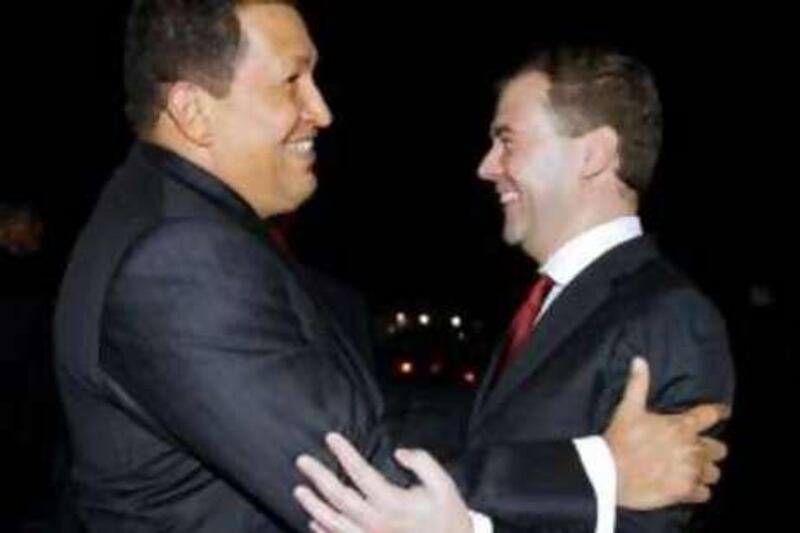CAIRO // It may take the equivalent of an earthquake to shake oil prices from their dogged downwards course, but Russia managed that briefly this week by announcing it would act with Opec to promote market stability. That it took Opec's chief rival, the world's second biggest oil producer after Saudi Arabia, to achieve what the oil exporters' group could not do alone underscores the growing sense of urgency surrounding Saturday's Opec meeting in the Egyptian capital.
It could also strengthen the hand of Venezuela, Russia's new best friend within Opec, as that country pushes for further Opec production cuts at the earliest possible opportunity. "Of course, we are concerned about the oil prices. These prices cannot be too low nor speculatively high," Dmitry Medvedev,the Russian president, said on Tuesday at a meeting with his Venezuelan counterpart in Caracas. "We are ready for discussions and co-ordination on the oil market with Opec countries."
Several Opec members support cutting oil production by at least a million barrels a day, and Venezuela and Iran have said they would like to see the cuts announced in Cairo. That meeting has been expanded from what was supposed to be a conference of Opec's Arab members, demonstrating the group's mounting unease as crude prices fall below levels some member states need to balance their budgets. "Cutting has to happen," the Venezuelan energy and oil minister, Rafael Ramirez, said on Tuesday, following the Caracas meeting at which the Russian and Venezuelan presidents signed energy and airline co-operation accords.
Other Opec ministers, including the organisation's president, have downplayed the prospect of a decision until a policy-setting meeting in Algeria on Dec 17. But last week's drop in oil prices to below the psychologically important threshold of US$50 a barrel has called that stance into question. "We suspect that should oil prices fail to rally by week's end, Opec officials meeting in Cairo will be given a green light to announce a production cut," said Edward Meir, an energy analyst at MF Global. "We doubt Opec has the luxury of waiting another three weeks."
Opec has meanwhile been signalling that whenever it makes its decision, the anticipated cut will be deep. "I think if we had a meeting today, 1 million [barrels per day] is not going to be enough," the Opec president Chakib Khelil said earlier this week. Venezuela, whose government relies on oil for about half of its income, has strengthened ties this year with Russia, helping to boost Moscow's co-operation with Opec ? something the oil exporters' group has sought but major oil consuming nations fear.
Exacerbating their rising political tensions with the US, and possibly helping to bolster the price of oil this week, Russia and Venezuela held joint naval exercises today involving Russian warships. At its Oct 24 emergency meeting, Opec called on other oil producing nations to share the burden of cutting crude output to stabilise prices. At the time, it received a non-committal response from Moscow and was rebuffed by Norway, the number two non-Opec oil exporter.
However, crude prices have fallen sharply since then, dipping to $48.25 a barrel last week, their lowest level since May 2005, before strengthening slightly this week. They have dropped by two-thirds, or nearly $100 a barrel, since July. On Tuesday, Saudi Arabia's finance minister said turmoil in the oil and financial markets could last for another year. The kingdom, Opec's most influential member, has yet to comment on oil production policy.
Nigeria's petroleum minister, Odein Ajumogobia, said he would press in Cairo for greater compliance with the previous Opec cut rather than seeking another reduction. The group that pumps about 40 per cent of the world's oil has agreed since early September to cut output by about 2 million barrels per day ? about 2.3 per cent of global oil demand. Its production is still higher than its official collective ceiling, but analysts estimate at least half of the promised reduction has been delivered.
But Opec may be running short of time if it hopes to make a difference to oil prices in coming months, against a backdrop of falling demand in major economies that are sliding into recession. Oil use is dropping as the economic slowdown causes people to travel less. The number of Americans travelling for this week's Thanksgiving holiday will fall by 600,000, or 1.4 per cent, the first drop since 2002, according to US motorist group American Automobile Association.
In the past, Opec has usually needed about a year to stabilise the market, said Michael Lewis of Deutsche Bank. "We're still looking for a low of about $30-$35 a barrel by the end of next year. That's the risk," he said. Among analysts surveyed on Nov 21 by Bloomberg, 10 expect Opec to lower production at the Cairo meeting while eight expect the decision to reduce to be delayed until next month. tcarlisle@thenational.ae





